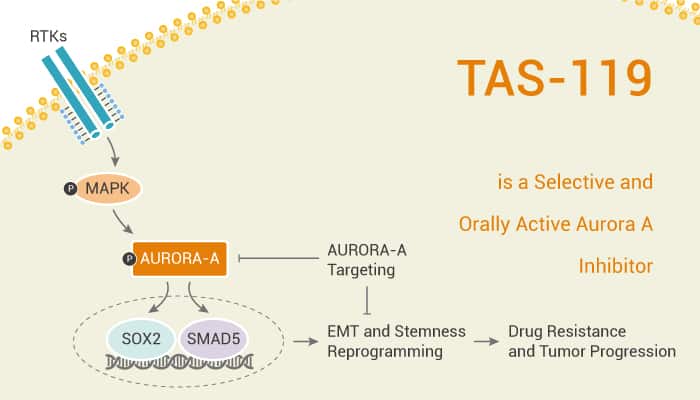Aurora kinases represent a serine/threonine kinase family crucial for cell-cycle control. In particular, Aurora kinases are important and indispensable in multiple steps of mitotic progression. Specifically, Aurora kinase A acts primarily during the prophase of mitosis. Overexpression of Aurora A in HeLa cells attenuates the antiproliferative activity of Paclitaxel. TAS-119 is an orally active small-molecule inhibitor of Aurora A with an IC50 of 1.0 nM. TAS-119 shows high target selectivity among 301 protein kinases, including Aurora B (IC50=95 nM).

In vitro, TAS-119 (30, 100, and 300 nM) enhances the antiproliferative effect of several taxane compounds. Moreover, TAS-119 (300 nM) enhances the antiproliferative effect of Paclitaxel in different cell lines, including Paclitaxel-resistant cells. In vivo, TAS-119 (5, 10, and 30 mg/kg) enhances the antitumor efficacy of Paclitaxel without affecting body weight in a nude rat HeLa-luc xenograft model. Furthermore, TAS-119 (60 mg/kg) enhances the antitumor efficacy of Paclitaxel and Docetaxel in a nude mice NCI-H460 xenograft model
In this study, Using in vitro and in vivo models, researchers tested the drug administration order for TAS-119 combined with Paclitaxel and the TAS-119 treatment duration. Besides, researchers demonstrated that TAS-119 enhanced the efficacy of taxanes in a preclinical model. In addition, TAS-119 does not exaggerate taxane-induced neutropenia and neurotoxicity. Herein, the best regimen in preclinical models is combining Paclitaxel or Docetaxel treatment with 4 days of TAS-119 dosing.
To summarise, TAS-119 is an orally active Aurora A-specific inhibitor. As a result, TAS-119 acts as a clinical candidate for safety and efficacy testing in combination with taxanes.